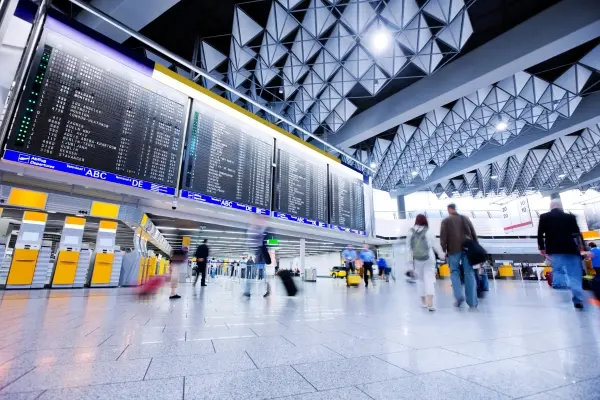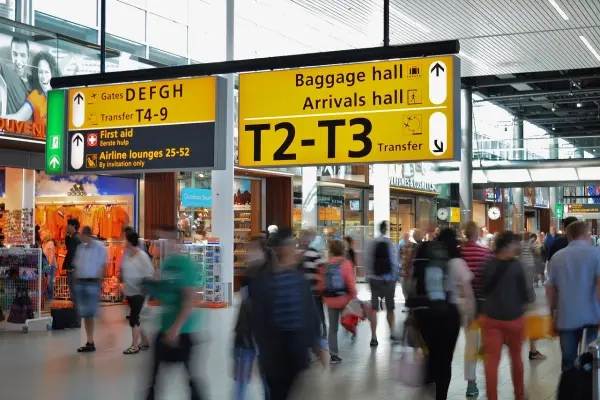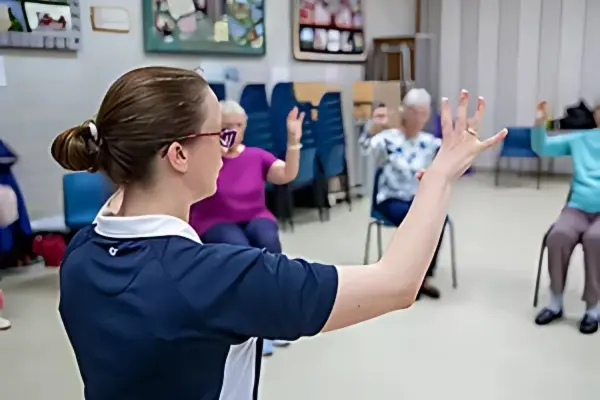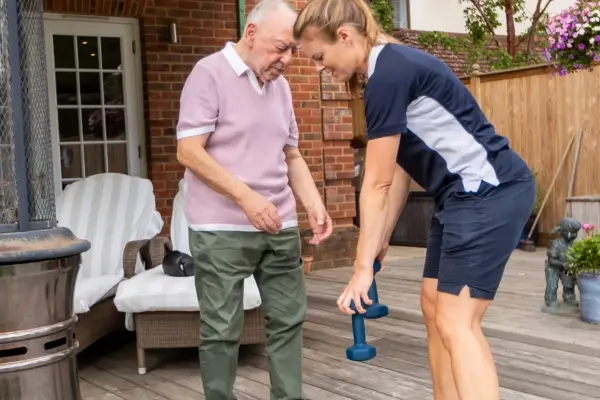Managing Physiotherapy Rehab on Holiday: Expert Tips for Stress-Free Travel
- Joanna Ward

- Jul 8, 2025
- 6 min read
Does your upcoming holiday leave you feeling more anxious than excited? Your mobility isn’t what it used to be. But don’t cancel that trip just yet. You can still enjoy a much-needed break with the right preparation and mindset.

Madeline is one of our regular attendees of FitMove with JLinks a fun, accessible physiotherapy class to improve fitness, strength and balance. She recently reclaimed her holiday enjoyment and took the stress out of travelling to stunning Sorrento by using airport assistance.
Here are Madeline’s insights, as well as our planning advice to successfully manage your physiotherapy rehabilitation during the holiday season.
Pre-planning for smooth travelling
“My main concern about the whole holiday was travelling,” Madeline shared with Joanna, JLinks Company Director, Physiotherapist and Fitness Instructor.
Due to her mobility issues, Madeline was worried about the amount of walking required in and around the airport. She also realised she wouldn’t be able to use the aircraft steps this year. Along with the usual organisational logistics when going on holiday, these concerns posed another layer of stress.

Stress causes adrenaline and cortisol to flow throughout your body. Excessive exposure to these hormones for an extended period can exacerbate mobility issues or injuries due to inflammation, muscular tension, and sleep disruptions.
We advise discussing a plan with your physiotherapist to ease your worries. Together, you can set manageable ways to maintain your recovery, such as incorporating exercises on the plane and making adjustments to your physiotherapy while away.
Madeline decided to take action. “Don’t underplay your disability,” she cautions. “If you think you need assistance at the airport, request it when you book.”

All airports are legally required to provide assistance for passengers with mobility issues.
This assistance is free of charge, but it must be requested prior to travel. Read more about the Special Assistance services at the major London airports here:
Information is useful, but what does your travel day with mobility assistance look like?
Madeline gives us her first-hand insight into the airport experience.
Travel day
Madeline’s flights were through Gatwick airport, and she expressed her satisfaction with the special assistance process, from start to finish.
“After customs, security and duty-free, the assistance desk is right in front of you. It’s a beautiful area with sofas and a coffee and snack machine. There’s space for family and friends, and it’s right next to the disabled loos. If you’d rather book a lounge, they can give you a machine that will alert you when you need to return to the assisted area.”
Getting to the aircraft and then onto the aeroplane usually involves boarding buses and climbing multiple staircases. Madeline went on to detail how the assistance during this phase of travel was critical.

“Someone took me on a buggy to the aircraft. I skipped the boarding queue entirely and went through the gate. I was taken to a buggy outside that had a lift. They wouldn’t let me touch my luggage at all - they deal with that for you. When I arrived at the aeroplane, I boarded via a lift on the opposite side to the stairs. The stewards then made sure I was taken straight to my seat.”
During the flight, it is essential to follow your physio's advice on maintaining regular movement. If your mobility issues or injury are aggravated by prolonged periods of sitting, remember to stand up or move your body safely to keep the blood flowing and your recovery on track.

When Madeline arrived at Naples airport, an employee met her at her seat and took her past the queues again and through security. “They can take your baggage off the conveyor belt and straight to your onward transport.”
Assistance on travel day certainly reduces a number of potential issues for people with mobility issues and disabilities. However, there will always be things that you can’t account for. Delays, for one! Our advice is to shift your focus from negative thoughts to things within your control, such as your movement breaks and comfort tools like snacks, reading material, and music.
Travelling is just one part of your holiday experience. How can you maximise enjoyment and manage your physiotherapy rehab during your holiday?
During your holiday
Going away with friends or family is exciting, but the thrill of the event can sometimes create social pressure to be involved and active in all the activities planned. While it can feel tempting to push yourself, it is far from helpful for your recovery.
We encourage all clients at JLinks Physiotherapy to discuss their holiday plans with us. That way, expectations can be set before going away, and adaptations to rehab exercises can be established. We want you to have the best possible holiday experience, and a clear mindset can help you achieve that.

When Madeline planned her trip to Sorrento, understandably, she felt anxious. As she’d visited the area before, she knew there would be a lot of walking and climbing steps.
Her tactic was simple: communication. She spoke with her family, and together they decided that she would be involved in all the plans but would monitor her energy and mobility frequently. If it felt like too much, she would sit in a cafe with a beer or coffee and her Kindle.
For an enjoyable and comfortable holiday:
Pace yourself - Prioritise gentle exercise that eases pain and improves wellbeing.
Establish a routine - Find a suitable space and time to do your physio exercises to maintain consistency in your recovery.
Adapt to your needs - If you do need to take a break or slow down, ask your travel companions to take photos and share stories about their activity.
Stay hydrated- Drink plenty of fluids and enjoy hydrating foods, such as fruits, to support healing, recovery, and overall functioning.
The best-case scenario is a smooth holiday with no issues related to your injury or setbacks in your rehabilitation. However, flare-ups do occur, and it’s important to be prepared for every eventuality.
Managing flare-ups
Organisation is vital to managing injury or mobility flare-ups on holiday. Here are some tips to consider before you travel:
Find out where the nearest hospital or urgent care centre is located and how you can access medical care if needed.
Pack sufficient medication and pain relievers for the duration of the holiday.
Consider packing lightweight travel mobility aids, such as canes, walkers or braces, if needed.
Most importantly, stay aware of your physical and mental energy levels during the holiday with regular body scans. You can complete a quick body scan a couple of times a day to gauge how much physical activity you can handle.

The ‘end of holiday blues’ affect everyone. This, combined with the stress of travelling home from a foreign airport, can hinder the recovery you’ve worked so hard to maintain throughout your vacation. Here’s more about how Madeline dealt with the final part of her holiday.
Your return travel
A foreign airport may have different systems and access arrangements in place. To avoid confusion when you return home, observation is key.
Madeline suggests that you take note of the assisted area's location when you arrive at your destination. You can pre-book assistance there and then, giving you peace of mind throughout your entire stay.
Madeline goes on to describe her experience of returning to the UK.
“When you arrive back in the UK, you stay in your seat, and the air stewards will come and help. You’re not alone. The lift is prepared for you, and you are driven on the buggy past the people walking to passport control. You are fully supported with your luggage and can even be driven to your taxi or onward transport.”
Managing Physiotherapy Rehab on Holiday: Expert Tips for Stress-Free Travel - Prepare and pace yourself this holiday season
A holiday should not feel out of reach, even if you are dealing with mobility issues. With greater accessibility at airports, a prepared mindset and consistent check-ins and communication with your travelling companions, your time away can be the uplifting and relaxing experience that you deserve.
If you’d like to chat more about your personal circumstances and movement goals during the holiday season, reach out to our friendly and experienced physiotherapy team at JLinks Physiotherapy.





Comments